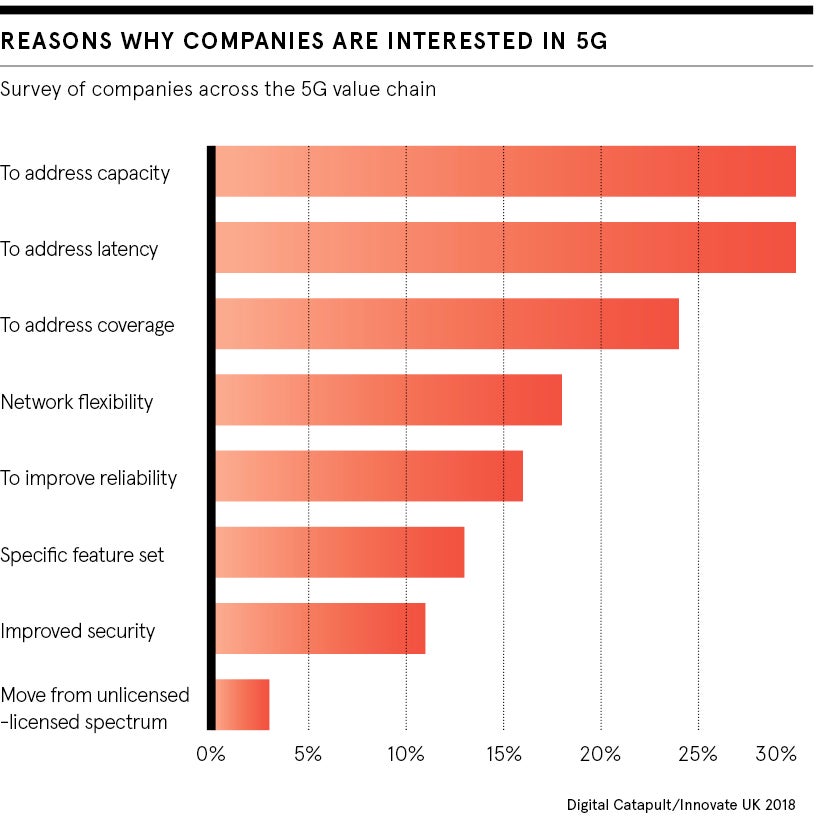Despite the hype around 5G, many organisations are still in the dark as to the potential benefits the technology could deliver to their business.
A 2019 study by global consulting firm Accenture suggests both business and technology executives underestimate the disruptive potential of 5G. More than half believe there are very few things that 5G will enable them to do that they cannot already do with 4G networks, and fewer than two in five expect 5G to bring a revolutionary shift in speed and capacity.
It is no surprise then that nearly three quarters of businesses say they need help imagining the future possibilities and use-cases of 5G. This is where specialist consultancies and market research companies will have an important part to play, helping organisations understand the benefits – and challenges – associated with the rollout of 5G, and tailoring a service to their individual requirements.
Why use a consultancy?
“The role of consultancies and research institutions is to provide simple and relatable insights about what 5G could mean for enterprises,” says Amol Phadke, global network practice lead at Accenture. “They should help create a strategy and monetisation model with business leaders around who to partner with, and how, and where and when they should invest in the technology to achieve the business benefits.”
So why might a business choose to partner with a specialist consultant over their telecoms service provider? It’s easy to imagine service providers, that will already be supplying the connectivity, helping their customers navigate this new hyper-connected world.
For many though, it’s a question of industry-specific expertise. “Not only should any adviser understand the technology and likely rollout and performance benefits of 5G, they should be experts in the specifics of operations in each sector,” says Tim Devine, technology expert at PA Consulting.
This view seems to reflect businesses’ own concerns – 60 per cent of the executives surveyed by Accenture believe there is a lack of knowledge among telecoms companies about the challenges their individual industries face.
Businesses say they need a partner that will work with them to identify 5G applications that are relevant to their unique environments. For example, Mr Devine says that if an organisation is using 5G to improve the operations of a transport network, the 5G device will need to be embedded in a remote video-monitoring system rather than being a handheld phone.
“This level of integration between network technology and applications has been an area where many telcos have struggled in the past. This is mostly because they don’t have the deep sector insight available to consultancies who work with organisations in each sector and thus, they should play an invaluable role in the development of 5G,” he explains.
Consultancies better placed to suggest tailored 5G solution
A consultancy can also recommend a range of products and approaches whereas service providers may only put their own services on the table. Moreover, they can provide detailed and independent advice regarding which products from which telco will best suit their business.
“Consultancies and research institutions play a vital role in providing independent analysis and insight about the latest technologies, and more importantly, the benefits they can bring to businesses,” says Dr Heidi Pinkney, lead consultant, technology strategy at Cambridge Consultants. “Research institutions can demonstrate the art-of-the-possible for new technologies in business environments, while consultancies, being inherently client focused, are well positioned to provide tailored advice to clients.”
Dr Pinkney believes that while telecoms companies “are well placed to develop and offer convenient enterprise services platforms based on 5G capabilities, a deep understanding of each business and the market in which they operate is key for these to be successfully adopted.”
However, Accenture’s Mr Phadke believes there is still “a very clear role” for communications service providers (CSPs). “Breakthroughs in immersive television, connected health, education and smart-city infrastructure will unleash opportunities that are difficult to imagine today. CSPs will play a pivotal role in bringing these prospects to light. The communications industry and CSPs will be at the forefront of rethinking its value chain to sell, deliver and support these new 5G solutions and the partner ecosystem will evolve accordingly,” he says.
Consultancies can help cut through 5G hype
At a fundamental level, says Dr Pinkney, “operators and businesses require a bridge, which may be a consultancy, ensuring that operators provide the right solution to this new category of client and that businesses truly understand both the language and the opportunity of emerging 5G technology.”
With 4G likely to continue to cater to consumer needs for the foreseeable future, it will fall to businesses to be the standard bearers for 5G – so companies should be getting to grips with the technology sooner rather than later.
“There is a lot of misunderstanding of what 5G is and what potential it can offer in short and long term,” says Zahid Ghadialy, principal analyst and consultant at advice site 3G4G. “Many buzzwords commonly used in the press like wireless fiber, less-than-a-millisecond latency and millimeter waves are just some of the aspects of 5G and won’t be realised in the near term. In the short term 5G will be like 4G on steroids.”
Consultancies are ideally placed to help cut through this hype. While the phrase ‘trusted advisor’ may be somewhat of a cliché, there is a valuable opportunity for consultancies to partner with businesses to plug their knowledge gap around 5G and enable them to benefit fully from the rollout of the technology.
Why use a consultancy?

